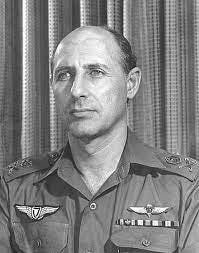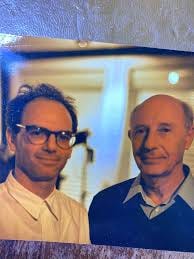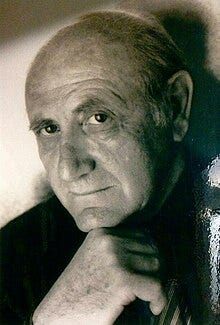EXTRACT 7 FROM MY MEMOIR
The Spy Who Fell to Earth: My Relationship with the Secret Agent Who Rocked the Middle East
CHAPTER 4: I UNMASK MARWAN (CONTINUES …)
LIKE OTHER SCHOLARS OF ISRAEL’S WARS, I, too, knew that once upon a time, there was a `miraculous’ Arab spy who had worked for the Mossad before the Yom Kippur War and went on to provide a critical warning of war. I hardly mentioned him in my early works as I had so little to add. It all changed in 1998 when I interviewed Eli Zeira for a BBC TV documentary series, The Fifty Years War: Israel and the Arabs.
Zeira is a well-known figure in Israel. He is an intelligent and charismatic retired military general who participated in Israel’s wars from 1948 to 1973. In the lead-up to the 1973 Yom Kippur War, he served as the director of the Military Intelligence Directorate (AMAN, in Hebrew). His job was to advise the prime minister and the government on the probability of war with the Arabs breaking out.
IDF General Eli Zeira, around the time of the Yom Kippur War.
In Israel in the 1970s, Eli Zeira was a rising star. It was often thought that he would one day become chief of staff of the Army and perhaps even a leading political figure. But the problem with Zeira was that he was too confident and arrogant - not the best characteristics for a director of military intelligence, who must be a good listener and, above all, cautious - even hesitant - with his analyses and advice, as they carry so much weight and responsibility. In the months before the Yom Kippur War, Zeira’s over-confidence led him - and as a consequence, led the prime minister and her government - to believe that the Arabs would not dare to attack Israel and that the chance of war breaking out was as Zeira put it to prime minister Golda Meir, `lower than low.’ War, he believed, was an impossibility. But Zeira was wrong, as Egypt and Syria did attack and caught Israel almost totally unprepared.
When the war was over, and the true price of it was revealed - not only in money but also in blood - the public was enraged, and soon, heads started rolling, the first one being Zeira’s. A National Inquiry Commission, headed by the Supreme Court’s Chief Justice Shimon Agranat, pointed the finger at Zeira, blaming him for stubbornly clinging to a false idea that there would be no war, blinding Israel’s leaders to an attack until it was nearly too late. Zeira was depicted as the ultimate villain and the chief person responsible for the Yom Kippur disaster. Humiliated, he resigned. The few friends who still met with him in his house in Zahala, north Tel Aviv, reported that he was a broken man.
In subsequent years, Zeira maintained a low profile, keeping himself to himself and rejecting all invitations to comment on the Yom Kippur War. He was still young, only forty-five, and full of energy and intelligence, which he channeled into a successful business career. At the same time, he was privately working on his memoirs, and when Yom Kippur War: Myth vs. Reality was published, he started spearheading an aggressive campaign to clear himself of the Yom Kippur stain and to show that the disaster was not his fault.
Now, in 1998, when our BBC interview finished, and we were having tea in the kitchen, Zeira, pointing at the camera, said to me in Hebrew, `Ze-Klum,’ meaning what we discussed in the filmed interview about the Yom Kippur War `is nothing.’ `Ha’sipur Ha’amiti’ - `the real story,’ he continued, is that the Mossad were `misled by an untrustworthy Egyptian double agent.’ I was taken aback and tried to push my luck and see if he would provide me with more information about the mysterious `double agent.’ But here, Zeira was careful and unwilling to play ball - he moved his hand in a zipping movement across his mouth to imply that he would not add a thing.
With Eli Zeira (on the right) after our BBC interview. He suspected that Marwan was a double agent.
In subsequent weeks, I became ever more interested in this 1973 story - obsessed is perhaps a better word to describe it - and did all I could to crack the nut and find out who the mysterious spy was and whether he was a genuine spy working for Israel, or - as Zeira claimed - a Trojan horse, an agent planted in the Mossad to deceive and ultimately betray them. I collected each and every scrap of information, of which there was not much, read all that was to be read on the Yom Kippur War and made lists of `potential spies.’ As I pored over the documents and memoirs, I compiled a shortlist of three potential spies, which I faxed to Zeira. His reply came in the shape of a short and abrupt fax message: `You’ll learn nothing from me!’ So I continued fumbling, but bit by bit, I managed to delete names from my `potential spies’ list until I was left with a single name - Ashraf Marwan, the son-in-law of the Egyptian President Gamal Abdel Nasser, who became my white whale. My next step would get me even closer to solving the mystery.
Zeira, as I have mentioned earlier, published his memoirs in the early 1990s, when he wrote of - though stopped short of naming - the Egytpain `double agent.’ Zeira was clearly unwilling to help me with the matter - but there was someone who might. Rami Tal was Zeira’s editor, and he was someone I knew. It might be, I calculated, that the two discussed the name. So I flew to Israel, phoned Tal, and invited him for a drink. I had planned my meeting with him meticulously and rehearsed it carefully, knowing that I’d probably got one chance and should I fail, I’d be stuck for a long time. I ran through what I would say to Tal, where exactly I would drop the name `Ashraf Marwan’ into our conversation, and what exactly I would look at when mentioning the name. I planned to see if Tal’s body language confirmed that Ashraf Marwan was the mysterious spy.
We met at Beit Sokolov, a popular Tel Aviv meeting place for journalists, and we sipped horrible, weak, and lukewarm coffee from plastic cups. Then, as I had planned in advance, ten minutes or so into our conversation, when Tal was warmed up but not yet tired of me, I said, out of the blue, `Ashraf Marwan’s the man,’ and I looked straight into Tal’s eyes. His response was unmistakable: he looked away and smiled. Tal’s body language confirmed that Ashraf Marwan was the top Egyptian Mossad spy.
I returned to London excited and euphoric, as I knew I had managed, after months of investigation, to crack the nut. But I also knew I had to tread carefully; the evidence was not strong enough. And what if I had got it wrong? What if Tal reacted the way he did because of something else, not in reaction to me dropping Marwan’s name? Such things, after all, are often in the eye of the beholder. So I took it step by step and very carefully started to drop hints about Marwan's identity, leaving myself just enough room to withdraw should Marwan deny it or threaten libel action. My plan was to raise the bar gradually, notch by notch, to try and elicit a response from him; should his reaction be too strong, I would then have made a quick retreat and have forgotten about the business altogether, which, in many ways, would have been a relief.
I dropped my first hint in a chapter on the Yom Kippur War for my book Israel’s Wars, which was published in 2000.
In Isreal’s Wars, I referred to the mysterious Egyptian spy as `the right-hand man' of Egypt’s President, Anwar Sadat.
There, I described a senior Egyptian who was, as I put it elliptically, `the right-hand man’ of Egypt’s President Anwar Sadat but who also served as a Mossad spy. I embraced Eli Zeira’s double-agent theory and explained that this person, whose name was still top secret, was actually a double agent, servicing Egypt at a time when Israel considered him a super-spy on her behalf. By that time, with Marwan’s name known to me - or at least I thought he was the man - I also saw that Zeira’s claim about Marwan playing a double game was not unreasonable.
He was a `walk-in’: he offered his services to the Mossad in 1970 unprompted, rather than being selected and recruited by them; thus, he was clearly a potential Trojan horse, planted by Egyptian intelligence to mislead. The testimonies of Mossad agents who followed Marwan’s movements in London before and after meeting his case officer, Dubi Asherov, also, I thought, strengthened the double-agent theory. His confidence, after all, was quite astonishing, phoning the Israeli embassy directly, walking into meetings with Asherov without so much as glancing over his shoulder, and carrying top-secret original documents in a bag to give to the Israelis. This could be seen as recklessness - and in later years, as I came to know Marwan personally, I detected this streak in his character - or perhaps as confidence that he was safe meeting the Israelis, knowing that he was really there on Egypt’s behalf. Zvi Malkin, an experienced Mossad operator who was often in charge of securing the meetings between Marwan and Asherov and with Zvi Zamir, the Mossad’s director, and who often followed Marwan in London - as far as Paris - to see with whom he met, testified as to how astonished he had always been at Marwan’s behaviour. `I saw him driving around with the registration number of the Egyptian embassy,’ Malkin recalled, `and this is how he came to see us [Mossad], with no fear, without any security precautions. I saw him enjoying himself in Paris in the Hotel George V with Sadat’s wife Jihan and her daughter and did not trust him from the first moment …. he was part of Sadat’s deception [plan against Israel]’.
Mossad agent Zvi Malkin, who protected the Director of Mossad during his meetings with Ashraf Marwan, always suspected that Marwan was a double agent
Rafi Meidan, the head of the Mossad station in London, to whom Dubi Asherov, Marwan’s direct controller, would report, also suspected that Marwan was misleading the Israelis. The British MI5, according to Meidan, was likely to know about spying activities in the capital, and it knew of Marwan and probably followed his moves, and it could have leaked to the Egyptians that Marwan was meeting with the Israels. But, according to Meidan, Marwan probably felt safe as the Egyptians sent him to meetings to mislead the Israelis.
What further strengthened my view that Marwan was misleading the Israelis was that twice before the war, in the autumn of 1972 and spring of 1973, as I have shown earlier, he warned the Israelis that Egypt would embark on war, but in both cases, the war failed to materialize. The warning, particularly in April 1973, led to major preparations and mobilization of forces in Israel and the maintenance of a high state of alert before the units were eventually dispersed. Marwan might have provided those false warnings in a sort of cry-wolf syndrome, enabling the Egyptians to monitor how Israel reacted in such emergencies, recasting their military plans accordingly. The most incredible fact, however, concerned the date at which Egypt decided on war. In memoirs of Egyptian officials of the period, it is mentioned that the first time a firm decision to embark on a war against Israel was actually taken was in Alexandria on 23 August 1973. So how could Marwan tell Mossad that it would happen in 1972 and April 1973, before the decision had even been made in Egypt? And why, when on 28 August 1973 Sadat sat down with the Saudi king and told him that war against Israel would happen `soon, very soon,’ did Marwan, who had been in the room with Sadat and the king - in fact, he was the only person with them in the room - report to the Israelis that Egypt had delayed plans for war? Why else, if not to deceive them? Zeira, the person who had kindled in me the interest in Marwan in the first place and in the idea that Marwan was misleading the Israelis, wrote in his memoir that the fact that Marwan (unnamed by Zeira) concealed crucial information by failing to report this meeting to the Israelis shows that he was `the jewel in the crown of the Egyptian deception plan.’
Finally, the warnings that Marwan gave the Israelis on the eve of the war, just hours before it started, increased my suspicion that he might have misled his handlers. Surely, he must have known that the information he had provided the Mossad with did not allow Israel enough time to mobilize her forces to the fronts, and when he phoned Dubi Asherov from Paris, he said he wanted to talk about `lots of chemicals’, a code to warn Israel of a general, no specific, danger of war. Marwan had much more specific code words that he could have used, thus giving the Israelis more time to mobilize. Instead, Marwan summoned the director of Mossad, Zvi Zamir, all the way to London to meet him the next day to whisper in his ear the specific warning of war. That meant another twenty-four hours’ dealy. Even when providing this late warning to Zamir, it seems that Marwan was misleading him again, for his warning was that war would start at `sunset’ whereas, in reality, it began at two o’clock in the afternoon. The Israelis wanted to act on Marwan’s information but, at the same time, wary of revealing that they had advanced knowledge of the attack, had planned to move their tanks into front-line positions on 6 October at 4 p.m. But by 4 p.m., it was much too late, as their positions had already been overrun by the invading enemy.
One of my students, an Egyptian who knew the Marwans, gave me Ashraf Marwan’s London address. I put a copy of my new book, where I hint that he was a Mossad spy and double agent, in an envelope, having marked the relevant pages, and dedicated the book: `To Ashraf Marwan, hero of Egypt.’ I sent it registered delivery so that I would know he had received it, and left all my details there for him so he could contact me if he decided to do so - my telephone number and home address. I then waited anxiously for him to react, but there was nothing. There was no response.
Two years passed; I published another book, A History of Israel. I decided I had nothing to lose, and so in this book, I raised the bar - not by a notch, but quite dramatically. In a chapter on the Yom Kippur War, without spelling out his name, I wrote about the mysterious Mossad spy and said that he was a `very close family member of Egypt’s President Nasser’ and that in Israel he was dubbed `The Son-in-Law.’ It was a lie designed to provoke Marwan, as the Israelis never referred to him as `The Son-in-Law.’ Of course, it did not take a genius to surmise that the spy was Ashraf Marwan, but I still left myself an exit, just in case he overreacted. If he did, I decided, I would say in my defense that the Israelis used `son-in-law’ as a nickname for a spy, and one should not regard it as a description of his family status. As I did with Israel’s Wars, I sent Marwan a copy of my new book, bearing the same inscription `To Ashraf Marwan, hero of Egypt,’ despatching it to his London address by registered post. I waited anxiously for his response. Again nothing. Then - a dramatic development.
In A History of Israel, I said that the Egyptian spy was a `very close family member of Egypt’s President Nasser’ and that in Israel, he was dubbed `The Son-in-Law’ which was a lie
On 2 December 2002, the Egyptian newspaper Sawt al-Ummah asked Ashraf Marwan to answer the question of whether he was the person at the heart of my story. I still have no idea how a copy of my book got to them. What Marwan told them was that my book was a `stupid detective story.’ Childishly, I felt hurt and upset with Marwan’s response and took it quite personally. But I also felt that he had blinked first; I expected him to say he would take me to court for libel, but he did not, and the fact that he did not threaten legal action was interpreted by me as a weakness and as a final confirmation - indeed, an admission - that he was the spy. So when an Egyptian journalist from the Al Ahram al Arabi newspaper phoned from Cairo, asking for my response to Ashraf Marwan’s rebuttal, I invited her to come and see me in London.
We sat in Starbucks in Wimbledon, and she told me that her name was Halud el Gamal. She dug out a list of questions she wanted to ask me, which I ignored before proceeding to say what I wanted to say. I confirmed that the person I called the `Son-in-Law’ in my book was Ashraf Marwan, the son-in-law of President Nasser of Egypt. Noting Marwan’s dismissive remark regarding my claims as being a `silly detective story,’ I told Halud that I had to defend my good name as a historian and that I could not accept Marwan’s allegations. I added that Ashraf Marwan was a perfect spy and an Egyptian national hero. I said he successfully managed to trick Israel, and he was the person who, more than anyone else, would be credited with Egypt’s success in deceiving Israel before the 1973 Yom Kippur War. Egypt, I added, should name a street after him.
After the interview, I went straight home. I was calm and focused. It took me no more than a few inquiries to locate Marwan’s offices in Cairo, where I assumed there was a fax machine. I talked to his secretary and, without giving away much, explained the urgency of the situation, whereupon she gave me Marwan’s private fax number, to where I sent the following fax, which was my first ever communication with Marwan:
To private fax AM: 00 202 4180423
Private & Confidential
9 December 2002
Dear Ashraf (if I may),
I was very disappointed with your interview to Sawt al-Ummah, where you said that the story about the Son-in-Law in my book A History of Israel is a `stupid detective story’ (I don’t myself read Arabic, and this is how your words were translated to my by a journalist from Al Ahram, who came to ask for my response to your allegations). Let me tell you just that: the story about the Son-in-Law was bound to be published - it was just a matter of time … If you wish to comment on my work, you are more than welcome to do so, and I am pretty sure you know how to contact me directly, given that I had left all my details in the books I’d sent you. But there is no point in challenging me over the pages of Sawt al-Ummah, thus forcing me to defend my reputation by responding to your allegations over the pages of Al Ahram al Arabi.
This was my way of explaining the motives behind the interview to Marwan and, more importantly, giving him some time to prepare a counter-attack. I knew the revelations would have shocked him greatly, for surely it is the greatest fear of a spy to wake up in the morning to read his real name in the newspapers. He might also have wanted to have some time to talk about the matter with his wife and children.
A couple of weeks later, I took my wife and kids to Bayswater, a district in London with a large Arab population, where newspapers and magazines are sold. I picked up a copy of Al Ahram al Arabi and, over a Mediterranean lunch, leafed through the pages. I could detect the interview as my picture was there, along with some of Marwan with Mona Nasser and her father, the president. When the waiter arrived, and I saw that he was of a Mediterranean background, I asked him to translate the headline. He read: `ASHRAF MARWAN A PERFECT SPY AND NATIONAL HERO’; that was an actual quote from the interview I gave. I shivered. The revelation would no doubt cause a sensation in the Arab world, where Marwan was well known for his marriage to Mona Nasser and, of course, in the Mossad. And how would Mossad react to my claims that Marwan misled them? How would they respond to the unmasking of what they considered to be their top spy ever? We left the restaurant and strolled into nearby Hyde Park, but my thoughts were elsewhere, so I left my family there and returned home, where I sat at my desk to write a letter to Marwan. I faxed it to his Cairo private fax machine:
Private & Confidential
29 December 2002
Dear Ashraf (if I may)
I’ve got here a copy of Al Ahram Al Arabi (21 December 2002) with my interview about the Son-in-Law. I can’t read Arabic, but I hope this piece reflects what was said in the interview. What is clear to me, though - given all the photographs accompanying the interview - is that the name of the Son-in-Law is clearly spelled out.
COMING SOON
CHAPTER 5: OUR RELATIONSHIP
![Ahro[n]pinion: Israel & Middle Eastern Affairs](https://substackcdn.com/image/fetch/$s_!raDG!,w_80,h_80,c_fill,f_auto,q_auto:good,fl_progressive:steep,g_auto/https%3A%2F%2Fsubstack-post-media.s3.amazonaws.com%2Fpublic%2Fimages%2Fa3267808-8a75-4b8a-acfb-53838512afbe_1059x1059.png)





